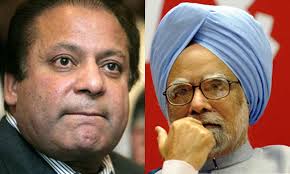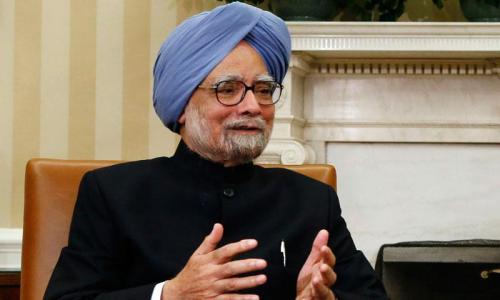India-Pakistan arms race ‘massive waste’, says Nawaz


UNITED NATIONS: Pakistan and India have wasted “massive resources” on a nuclear arms race, Prime Minister Nawaz Sharif said Friday ahead of a landmark meeting with his Indian counterpart.
Sharif said he was looking forward to meeting with Prime Minister Manmohan Singh to “make a new beginning” in the relationship between the South Asian nuclear rivals.
“Our two countries have wasted massive resources in an arms race,” the premier told the UN General Assembly. “We could have used those resources for the economic well-being of our people,” he added.
Despite clashes in disputed Kashmir this week, Sharif is expected to meet with Singh on Sunday, on the sidelines of the annual gathering of world leaders at the UN.
Both sides have spent huge amounts on developing a nuclear bomb over the past three decades.
It will be their first meeting since Sharif was re-elected in May – his third term as premier, but first since he was ousted in a 1999 coup.
Sharif told the General Assembly it was a ''new dawn'' for Pakistan.
“We still have that opportunity. Pakistan and India can prosper together; and the entire region would benefit from our cooperation.”
Sharif said: “We stand ready to re-engage with India in a substantive and purposeful dialogue.”
He said he was looking forward to the chance “to make a new beginning” and added “we have a solid basis to do that”. Sharif said Pakistan and India must build on a 1999 accord which called for the resolution of all differences through negotiations.
“I am committed to working for a peaceful and economically prosperous region. This is what our people want and this is what I have long aspired for,” Sharif said.
He also urged the US to stop drones strikes in Pakistan.
On top of being nuclear rivals, the two countries have disputed the Himalayan region of Kashmir since 1947.
New clashes erupted again this week in the region, split between the two, in a gradual build-up since an ambush in August in which five Indian soldiers were killed on the unofficial border.
India blamed the Pakistan army for the attack, a charge that Islamabad denied.
Terrorism: ‘Dialogue must not be seen as tool of appeasement’
In his wide-ranging address to the UN General Assembly, which received a warm round of applause, the prime minister said Pakistan has suffered grievously in the face of terrorism and is firmly opposed to all forms and manifestations of terror and would also explore dialogue to end militancy.
He, however, underlined that the dialogue should not be seen as a tool of appeasement.
Prime Minister Sharif said in the past 12 years, Pakistan has given huge sacrifices, in blood and resources.
“We have lost 40,000 precious lives of men, women and children, which include 8,000 defence and security personnel. There have been colossal damages to social and physical infrastructure as well. Our economy has been denied the opportunity to grow fully.”
“This must change now. I have tried to forge national consensus on a cohesive policy to eliminate terrorism from our soil. For that purpose, I convened an all Parties Conference, which spoke unanimously against terrorism.”
“We are resolved to oppose the forces of terrorism, by all means at our disposal. At the same time, we have offered dialogue to end violence, wean young extremists off extremism, and integrate all segments of our society into the national mainstream.”
“Winning hearts and minds, particularly of the youth, is as important as using guns to deter terrorism. But dialogue should not be seen as a sign of weakness or a tool of appeasement.”
The war against terrorism must be waged within the framework of international law.
Church attack
The prime minister also spoke on the Peshawar church blasts which killed more than 80 people.
“We are deeply saddened by the recent terrorist attack on the members of a minority community in Peshawar. This heinous attack has united the entire Pakistani nation in support of our brothers and sisters of all faiths in Pakistan. We share their grief and declared three days of mourning,” Sharif said. He said the attack was carried out by the same elements that had attacked mosques, shrines, innocent citizens, and members of the security forces. The Peshawar blasts, he said, had further strengthened his government’s resolve to deal with terrorism and extremism in a resolute and comprehensive manner.
“Terrorism knows no borders. It has no religion or creed, which is why maligning a whole people or a religion on this account, is unfair and unwise,” the prime minister said.
“Islam is a religion of peace, compassion and brotherhood.”
Sharif said that although extremism was not specific to any religion, “the most insidious form of contemporary racism in the name of religion is on the rise”.
“Peaceful Muslim communities are profiled and subjected to discriminatory practices. Their faith, culture, holy personalities and scriptures are under attack.”
This stereotyping of Muslims as extremists and terrorists must stop, he warned.
“We must all use the influence and reach of the United Nations to avert a clash of civilisations and promote harmony among followers of diverse religions, all around the world.”
‘US drone strikes’
Declaring the use of armed drones in the border areas of Pakistan a continued violation of its territorial integrity, the premier said it was also detrimental to efforts of the government to eliminate extremism and terrorism from Pakistan.
“I have urged the United States to cease these strikes, so that we could avert further casualties and suffering.”
“Terrorism negates Islam's humanistic outlook and noble values. Those who perpetrate terrorism are enemies of Muslims and Islam itself,” said Sharif.
‘UN peacekeeping, environment’
The prime minister said Pakistan was the largest troop contributor to UN peacekeeping since 1960, and had contributed 150,000 troops.
“One hundred and thirty five of our peacekeepers have lost their lives in service of peace. This is our most tangible assistance to the United Nations efforts to maintain international peace and security.”
“We fully support the United Nations' effort to finalise and implement a single, coherent post-2015 Development Agenda that identifies benchmarks for poverty alleviation, sustainable development and social inclusion.”
“More importantly, we should prepare ourselves to respond effectively to save our planet from the ravages of climate change,” he added.
‘Afghanistan’
Prime Minister Sharif also reaffirmed Pakistan’s commitment to a stable Afghanistan.
“We reaffirmed our shared goal of a peaceful, stable and united Afghanistan with President Karzai.”
“The people of Afghanistan are and should remain masters of their own destiny. We support an inclusive, Afghan-led and Afghan-owned peace process, leading to national reconciliation.”
‘Economic reforms’
The prime minister said his government had undertaken an economic revolution in Pakistan so that it too, can become part of the emerging markets.
“We have all the fundamentals and human and natural resources for such a transformation.”
“In the immediate future, our challenge is to overcome a volatile security environment, correct structural imbalances in the economy and bring an end to energy shortages,” he said.
The Kashmir dispute
As in the past, Pakistan once again raised the Kashmir issue at the General Assembly, urging the international community to give Kashmiris an opportunity to decide their future peacefully, in accordance with the United Nations Security Council resolutions.
Noting that the issue of Jammu and Kashmir was presented to the Security Council in January 1948, the prime minister said: “And yet the issue remains unresolved after nearly seven decades.”
The prime minister said the United Nations needed reforms and Pakistan believed that the Security Council’s composition should be made more representative. The intended reforms must, however, plan for a dynamic future, not entrench or replicate outdated historical patterns, based on privileges, he warned.
He also stressed the need to fully restore the role and authority of the General Assembly.
Palestine
The prime minister welcomed the resumption of the Middle Peace process, hoping that it would lead to the consolidation of an independent, viable and contiguous state of Palestine, based on the pre-1967 borders, with Al Quds Al Sharif as its capital.
Syria
The prime minister welcomed the US-Russia agreement on Syria and appealed to the Syrian government and opposition groups to work on a road-map for national reconciliation and the necessary political transitions.
Nuclear disarmament
Sharif said Pakistan would continue its adherence to the policy of Credible Minimum Deterrence, without entering into an arms race.
“We would not, however, remain oblivious to the evolving security dynamics in South Asia, nor would we agree to arrangement that is detrimental to our security and strategic interests,” he said.
“Our position on the proposed Fissile Material Treaty is determined by our national security interests and the objective of strategic stability in South Asia.”
The prime minister said Pakistan qualified for full access to civil nuclear technology for peaceful purposes, to meet its growing energy needs, for continued economic growth.
Pakistan also has “impeccable credentials” to join the multilateral export control regime, including the Nuclear Suppliers Group, he added.
– AP/AFP/APP & Dawn Newspaper














































